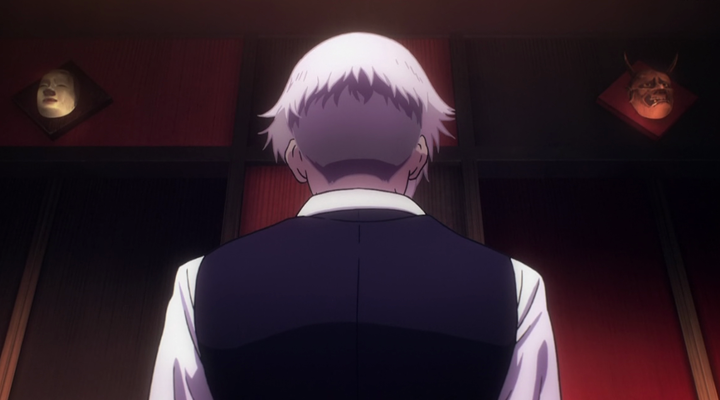Death Parade: A Look into Life, Death, and Humanity (original) (raw)
This time last year, Madhouse brought us the continuation to Death Billiards - Death Parade! In it, we're given a deeper look into how the afterlife is run and a more thorough look into the processes which go into delivering judgements. But are humans really that easy to sort into good and bad?

Every now and again, a series sneaks in amongst the proliferation of moe, bishie, and other highly anticipated anime in order to offer a more thoughtful take on life. Death Parade was released around this time last year, following the success of Death Billiards in the 2013 Anime Mirai project. Death Billiards told a simple story about two men - one young, one elderly - who arrive at a mysterious bar and are asked to play a game of billiards as if their lives were at stake. Death Parade continued this and also gave us background information into the world: what goes into preparing the souls who play these deathly games and how the arbiters came to be.
Overview
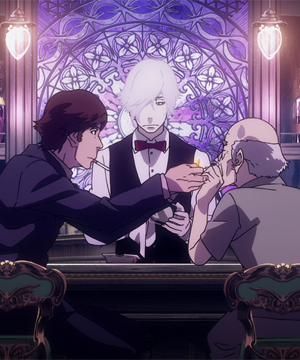 Before we dip into the themes behind this anime, let's review the setting. Most of the episodes deal with a couple - rarely related - who happened to die at the same time. They arrive by elevator with little to no memory of how they came there. This is important because it creates an almost blank slate from which the two players act upon. After confirming their lack of memory, the arbiter lays out the rules for their stay and then has them pick a game through roulette. The crucial aspect of playing these games is that the players must bet their life on the outcome.
Before we dip into the themes behind this anime, let's review the setting. Most of the episodes deal with a couple - rarely related - who happened to die at the same time. They arrive by elevator with little to no memory of how they came there. This is important because it creates an almost blank slate from which the two players act upon. After confirming their lack of memory, the arbiter lays out the rules for their stay and then has them pick a game through roulette. The crucial aspect of playing these games is that the players must bet their life on the outcome.
A simple premise, right? However, as the pair proceed through the game, their memories begin to return to them. They discover they can hurt each other by playing cleverly with the tools they're given. What begins as a friendly or competitive battle descends into an ugly skirmish to win, revealing how each individual acts as desperation and misguided belief drive their subsequent actions.
The point of these games is to force each person to reveal their true nature. Are they generous? Deceitful? Do they try to sabotage their opponent in order to win, or do they surrender and allow the other a free pass to victory, despite the fact they might die? What the arbiters don't tell their players is that they are already dead. Winning or losing the game does not change the final outcome, which is whether their soul is granted the chance to be reborn or is condemned to the abyss.
Memories and Emotional Recall
Ginti: "It's absurd how humans all behave the same way. They all forget they're going to die someday, yet the moment they come face to face with death, they cling to life. That's why, up until now, I've never had a second thought about any of my judgements." -- episode 11
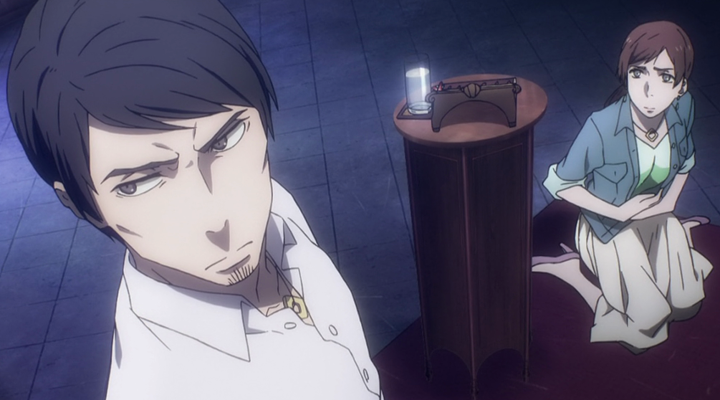
To make matters more complicated, the memories of those who play are rarely as straightforward as initial flashbacks lead us to believe. Take the first two episodes for example: a couple on their honeymoon find themselves in the bar of Quindecim, attended by an arbiter known as Decim. It appears to be a simple case of an unfortunate car crash, but as the couple's memories return, a twisted story of misunderstanding reveals itself. The husband recalls overhearing his wife's friends talking about a woman called 'Macchi'. As his wife's name is 'Machiko', he assumes that they are referring to her. This turns out to be false, but the suspicion it plants leads him to accuse his wife of having an affair. A flashback from the wife seems to confirm this. However we don't learn until episode two, from observations made by the Black-haired Woman, of the possibility that the wife's affair had been a one-time incident which she later regretted, and that her inflammatory words were chosen in order to condemn herself and save her husband.
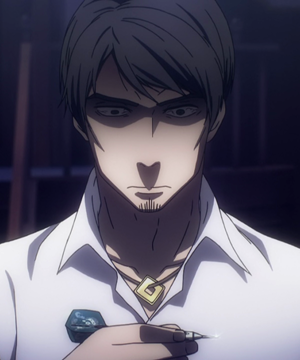 Episode one and two go on to set the tone for the rest of the guests which visit Quindecim. Each pair we see regain pieces of their memory in no apparent order, leading to false beliefs which may or may not incite extreme reactions against the other person. That's the purpose of the games after all: to push people into acting on their darkest impulses. The given reason for doing this is so that the arbiters can more easily judge the nature of a human being. Arbiters have access to both parties' memories and make their judgements based on both them and actions taken during the game.
Episode one and two go on to set the tone for the rest of the guests which visit Quindecim. Each pair we see regain pieces of their memory in no apparent order, leading to false beliefs which may or may not incite extreme reactions against the other person. That's the purpose of the games after all: to push people into acting on their darkest impulses. The given reason for doing this is so that the arbiters can more easily judge the nature of a human being. Arbiters have access to both parties' memories and make their judgements based on both them and actions taken during the game.
There's a flaw to this system though. Arbiters, by necessity, are stripped of emotion. They are what we'd consider perfect judges, unable to be manipulated.
But that's a good thing... right? Unfortunately, the arbiters' lack of empathy is a double-edged sword because they are so immune to emotional manipulation that they cannot understand it or even see it happening. In Decim's case, his inability to realize that humans can lie and hurt someone in order to protect them means he missed the wife's deception in episode one. This results in an incorrect judgement.
Decim: "It was all an act?"
Black-haired Woman: "That's how it seems."
Decim: "That's incomprehensible. After all, they were already dead."
Black-haired Woman: "I think that's precisely why she did it."
The suitability of emotionless arbiters to perform judgements on the dead is a question which occurs repeatedly. Some judgements are straightforward (episode three: Rolling Ballade), others less so (episodes four, six, and eight/nine: Death Arcade, Cross Heart Attack, Death Rally/Death Counter). When it comes to the latter, which direction to send each soul becomes a more thorny problem. Does murder remain unforgivable even if it's driven by desperation? If it's fueled by a sense of righteous purpose? What if a person, initially intending foul play, undergoes a change in attitude and tries to save their opponent instead? Does that single act atone for their prior behaviour?
The motive behind their actions during the arbiters' games can paint a person in different shades of morality, but can the same criteria be used to judge everyone? Let's see the kinds of strategies arbiters use to try and separate the 'good' from the 'bad'.
Manipulation
Manipulation of perception is vital to each game. There are five rules laid out to each pair before the game is chosen:
- They cannot be told where they are.

- The two are there to play a game.
- The game they play will be chosen by roulette.
- Their lives will be staked on the game.
- Until the game is over, they cannot leave the area.
Naturally, the fourth and fifth rules are what most people focus on. Having forgotten their own deaths, players truly believe that they will die if they do not play. This belief isn't helped when it comes to Decim's bar, where lifelike, shadowy mannequins are hung behind the bar and revealed if players require further persuasion. Therefore, operating under the belief that the game they play is life-or-death, the players begin the game.
Arbiters are all given a switch which allows them to cause minor incidents during gameplay, hopefully pushing one side or the other towards taking extreme actions in order to win. We see it used to throw off those who have a clear advantage in a game, to unsettle and plant the idea that they might lose in their minds. Decim's assistant first raises an objection to this strategy during episode four, Death Arcade.
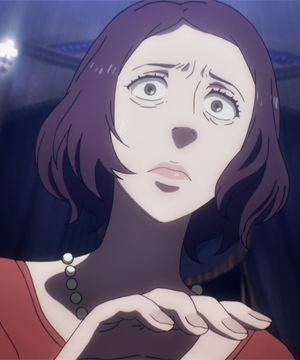
Decim: "Until we see into the darkness of the soul, we cannot pass judgement."
Black-haired Woman: "This is just... This is just dragging it out of them by force!"
-- episode 4
The situation Decim creates in that episode ends with one of the players slamming the other's head into their arcade machine, knocking them unconscious. While it can be argued that it wouldn't have happened had Decim not interfered, the argument can be made that not interfering would not have brought out that murdering player's desperation to live. That player tries to argue after the game's conclusion that it wasn't fair to judge her actions when they knew nothing of her circumstances: she'd been forced to act that way due to a string of betrayals and poor decision-making earlier in her life.
One can say that she had been a disgraceful human being both in life and after death anyway. She could have made different decisions and acted better, but she didn't, so she deserved to be sent to the void. However, it's important to note that she had always been taken advantage of during her life and, as a result, had learned to act the same way towards others. Do we then blame her, or do we blame those who made her that way? How much of our actions is a result of nature or nurture?
Either way, it's an undeniable truth that arbiters cultivate suspicion and ill will in their players. Whether their interference skews results one way or another can only remain hypothetical.
Decim: "Is it possible that these extreme situations are not showing us the darkness that already exists in people's souls, but rather are serving as a means to create it?" -- episode 10
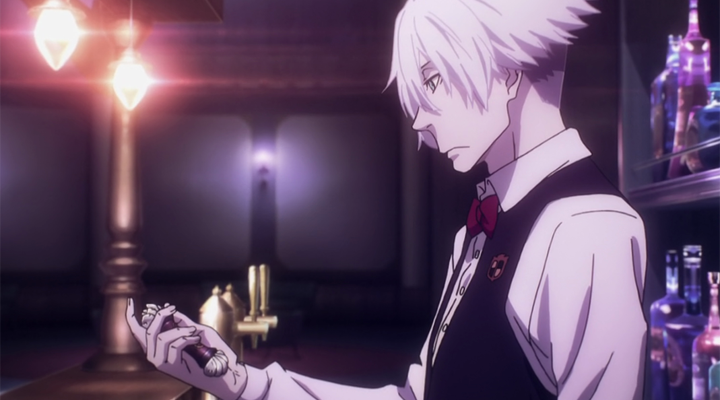
Judgement
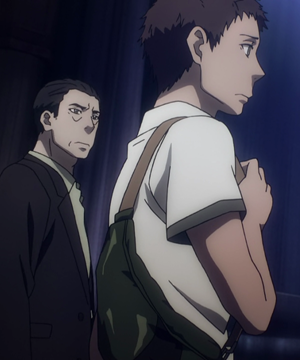 Finally we arrive at judgement. Arbiters traditionally base their judgements on the actions taken by players during games. Those who resort to underhanded tactics in order to win are generally sent to the void, and those who refrain from acting on their impulses (or show true regret) are given a chance at reincarnation. It is possible for both players to be sent one way or the other.
Finally we arrive at judgement. Arbiters traditionally base their judgements on the actions taken by players during games. Those who resort to underhanded tactics in order to win are generally sent to the void, and those who refrain from acting on their impulses (or show true regret) are given a chance at reincarnation. It is possible for both players to be sent one way or the other.
One of the best examples of the controversial nature of handing down judgement can be found in episodes eight/nine. It involves a situation where the ones being judged are pushed into making a heavily emotional decision, the result of which decides their fate. One is a young man (Shimada) who discovers that the other player, an older detective (Tatsumi), had witnessed his sister's assault but had done nothing to prevent it. After their game, the angry and distraught Shimada is given the chance to inflict unimaginable torture on the detective, and he starts to. But he falters at Chiyuki's objection. There's a back-and-forth where Chiyuki attempts to remind him of Shimada's love for his sister, but the detective taunts him.
Black-haired woman: "If you're reincarnated, you may be able to see your sister again in another form. That man [Decim] is watching your behaviour, trying to judge you. Please control your anger! Don't you care about being with your sister? If you get cast into the void, you'll lose that chance forever!"
(Shimada starts to lower the knife, but...)
Tatsumi: "That's naive thinking. If you can't protect someone yourself, all you can do is kill the other person. It's not hard to see the world is a cruel place. If you can't change the world, then you have to change yourself!"
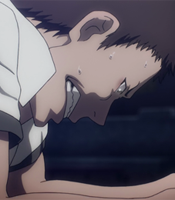
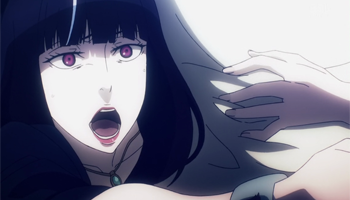
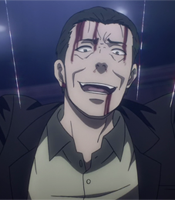
As a result, both men are sent to the void. It seems a straightforward decision given what happened, but consider this: would Shimada have chosen to inflict excruciating pain on Detective Tatsumi had he not been prompted or given the means to do so? If his initial hesitation is any indication, had both Decim and Tatsumi remained silent then he might have thrown aside his knife.
Final thoughts
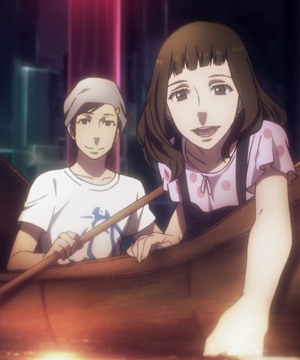 Death Parade is first and foremost an examination of humanity. It explores the hazards which come with tasking emotionless beings with human judgement and presents its viewers with a range of individuals with whom we can't help but sympathise. This series isn't about who is right and who is wrong; it's about how we perceive the worth of a human being. If there is any failing in this series, it is that there are few people who are truly not worthy of any sympathy - or perhaps that's the point. Perhaps this anime is trying to tell us that there isn't anyone who doesn't deserve some sympathy for the way they lived their lives. We are all products of a complex web of human relationships.
Death Parade is first and foremost an examination of humanity. It explores the hazards which come with tasking emotionless beings with human judgement and presents its viewers with a range of individuals with whom we can't help but sympathise. This series isn't about who is right and who is wrong; it's about how we perceive the worth of a human being. If there is any failing in this series, it is that there are few people who are truly not worthy of any sympathy - or perhaps that's the point. Perhaps this anime is trying to tell us that there isn't anyone who doesn't deserve some sympathy for the way they lived their lives. We are all products of a complex web of human relationships.
If people betray us then we learn suspicion. If people hurt us then we learn to hurt back. If people show us kindness then that kindness is reciprocated. Put together, all these experiences serve as the basis for future actions we take, yet the arbiters' job is to draw out the worst parts of ourselves and render judgement on it.
Black-haired Woman [to Decim]: "You've never even lived. You don't understand the first thing about grief. It's not just grief; there are as many emotions as there are people. The fragility of someone who lets their anger get the best of them, the strength to overcome fear out of love - you can't comprehend the way they feel. So how could you possibly pass judgement on them?" -- episode 9
While there are plenty of other aspects which can be delved into in this series, this article can't cover them all. As you watch (or rewatch) Death Parade, try not to judge the characters on black and white criteria like the arbiters. Think about why they act the way they do, whether that's in kindness or in cruelty. Think about your own experiences, your prejudices, your beliefs, how you would act if you were made to play a death game - and then try to judge yourself.
Would you send yourself to Heaven or Hell?
